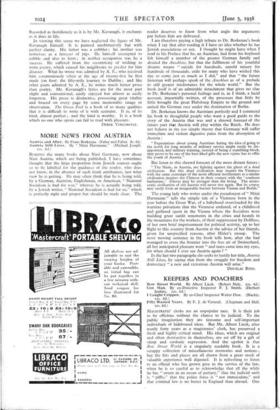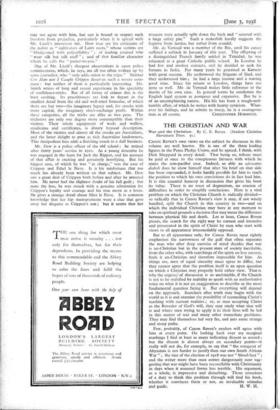KEEPERS AND POACHERS
I Caught Crippen. By ex-Chief Inspector Walter Dew. (Blackie. Its. 6d.)
MAGISTRATES' clerks are an unpopular race. It is their job to be officious without the chance to be judicial. To the public imagination they are tiresome and self-important
individuals of hidebound ideas. But Mr. Albert Lieck, after nearly forty years as a magistrates' clerk, has preserved a fresh and highly critical mind. His ideas, which are original
and often destructive in themselves, are set off by a gift of sharp and sardonic expression. And the upshot is that Bow Street World is a singularly readable book. It is a
scrappy collection of miscellaneous memories and notions ; but the bits and pieces are all drawn from a great stock of
valuable experience well digested. It is refreshing to listen to an official who has grown grey in the service of the law, when he is so candid as to acknowledge that all the while he has " swum in an ocean of perjury," that the judicial oath is " piffle," that the police force is " not immaculate," and
that criminal law is no better in England than abroad. One
may not agree with him, but one is bound to respect such freedom from prejudice, particularly when it is spiced with Mr, Lieck's irreverent wit.- How true are his criticisms of the police as " cultivators of Latin roots," whose victims are " bludgeoned with polysyllables " ; of leading counsel who " wear silk but talk stuff " ; and of that familiar character whom he calls the " putter-to-you."
One of Mr. Lieck's sharpest observations is upon police reminiscences, which, he says, are all too often written up by some journalist, who " only adds onion to the tripe." Neither Con Man nor I Caught Crippen deserves such a severe com- ment : but neither of them is particularly interesting. Mr. Smith writes of long and recent experience in his speciality of confidence-tricks. But of all forms of crimes this is the least exciting. Its practitioners are loth to depart in the smallest detail from the old and well-tried formulae, of which there are but two—the imaginary legacy and, for crooks with more capital, the imaginary stock-exchange profit. Within these categories, all the tricks are alike as two peas. The tricksters are only one degree more contemptible than their victims. Their whole equipment of wads and wallets, syndicates and certificates, is dreary beyond description. Most of the victims and almost all the crooks are Australians, and the latter delight to pose as rich Australian landowners, This Antipodean bias adds a finishing touch to a dull business.
Mr. Dew is a police officer of the old school ; he retired after thirty years' service in 191o. As a young detective he was engaged in the hunt for Jack the Ripper, and his account of that affair is exciting and genuinely horrifying. But his biggest case, of which he was " in charge," was the case of Crippen and Ethel le. Neve. It is his misfortune that too much has already been written on that subject. Mr. Dew saw a great deal of Crippen both before and after he arrested him. He never had the slightest doubt of his full guilt ; but none the less, he was struck with a genuine admiration for Crippen's loyalty and courage and his true merit as a lover. He gives a strange detail about Miss le Neve. It is common knowledge that her hip measurements were a clue that gave away her disguise as Crippen's son ; but it seems that her
trousers were actually split down the back and " secured with a large safety pin." Such a makeshift hardly suggests the fugitive from justice, but rather from scandal.
Mr. de Verteuil was a member of the Bar, until his career suffered a setback in January of this year. The offspring of a distinguished French family settled in Trinidad, he was educated at a great Catholic public school. In London he had few and modest contacts, and he decided to seek his fortune in India. For many years he practised at Karachi with great success. He understood the litigants of Sind, and they understood him ; he had a large income and a roaring good time. Since his return to London, things have not gone so well. Mr. de Verteuil makes little reference to the merits of his own case. In general terms he condemns the English legal system as pompous and expensive. But he is of an uncomplaining nature. His life has been a rough-and- tumble affair, of which he writes with hearty cynicism. What- ever his failings, and he admits to many, he is a courageous



















































 Previous page
Previous page